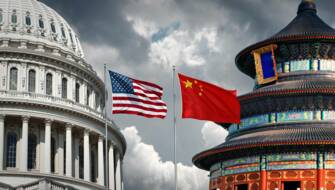In July and August 2023, coups d'état took place in Niger and Gabon, putting the spotlight back on this type of event. Looking at the evolution of coups d'état worldwide from 1950 to the present day, we observe that there has been a greater concentration of coups in Africa since the early 2000s, a trend that has been particularly confirmed over the last five years.
The importance of Africa in the historical development of coups d'état worldwide
Between 1950 and September 2023, 491 coups d'état, 245 of them successful, were recorded in 97 countries. Latin America and Africa stand out as the two regions of the world most affected, accounting respectively for 29% and 44% of recorded coups. Since the 1990s, there have systematically been more coups in Africa than in the rest of the world. Over the last decade, these attempts, mainly in the Sahel region, have had a higher success rate than in the past.
The evolution of Coface’s political and social fragility index in the Sahel1 between 2008 and 2014 clearly differs from that of other countries on the continent, with a notable increase since 2012. Armed conflicts and military operations, particularly those linked to the fight against terrorism, and regional instability, have contributed to aggravate social and political tensions.
Official development assistance is crucial for many African countries...
Many African countries are faced with growing poverty and high levels of debt, a situation worsened by reduced access to financing due to rising interest rates, while their financing needs remain substantial. In this context, Official Development Assistance (ODA) flows can play a crucial role.
ODA remains an important component of the Gross National Income (GNI) of some recipient countries. In sub-Saharan Africa, net ODA represented 3.4% of GNI in 2021 and 4% in 20202. In Mali, it reached around USD 1.4 billion in 2021, or 30% of the total government budget. However, these flows vary considerably from one country to another and from one year to another.
...but also a strategic tool used by donor countries
Several donor countries and international organisations have chosen to suspend their aid to punish non-compliance with democratic principles, as demonstrated by the suspension of ongoing French ODA3 projects in Niger and Burkina Faso in 2023.
When analysing the variations in ODA flows in response to a successful coup d'état, we observe that during the Cold War (1950-1989), OECD4 Development Assistance Committee donors did not systematically sanction successful coups by reducing their aid. In fact, they used it as an economic and political tool to maintain their influence, particularly in sub-Saharan Africa, over potential allies in the developing world.
Between 1990 and 2010, successful coups led to a significant reduction in foreign aid, showing that donor countries sanctioned coups more regularly.
However, forthe most recent period (2011-2021), the variations in ODA appear to be moving towards those observed during the Cold War. In a multipolar and more fragmented world, marked by the return of national and competitive geostrategic interests, the behaviour adopted by donor countries could be increasingly like that of the pre-1990 period.
This new world configuration could limit the use of ODA as a means of pressure, particularly by the Western bloc, against the perpetrators of coups d'état, who have the opportunity to move closer to the major emerging countries already present in Africa with well-defined diplomatic and commercial strategies.
Download our full study to learn more.
1 Sahel = Burkina Faso, Mali, Mauritania, Niger, Sudan and Chad
2 https://data.worldbank.org/indicator/DT.ODA.ODAT.GN.ZS?locations=ZG
3 With the exception of humanitarian aid, a few specific projects for populations in similar situations, and certain projects carried out by partners with multilateral funding (the interruption of which could give rise to legal risks), autonomous organisations such as local authorities, universities and NGOs can continue their cooperation without financial support from the State.
4 Organisation for Economic Co-operation and Development






